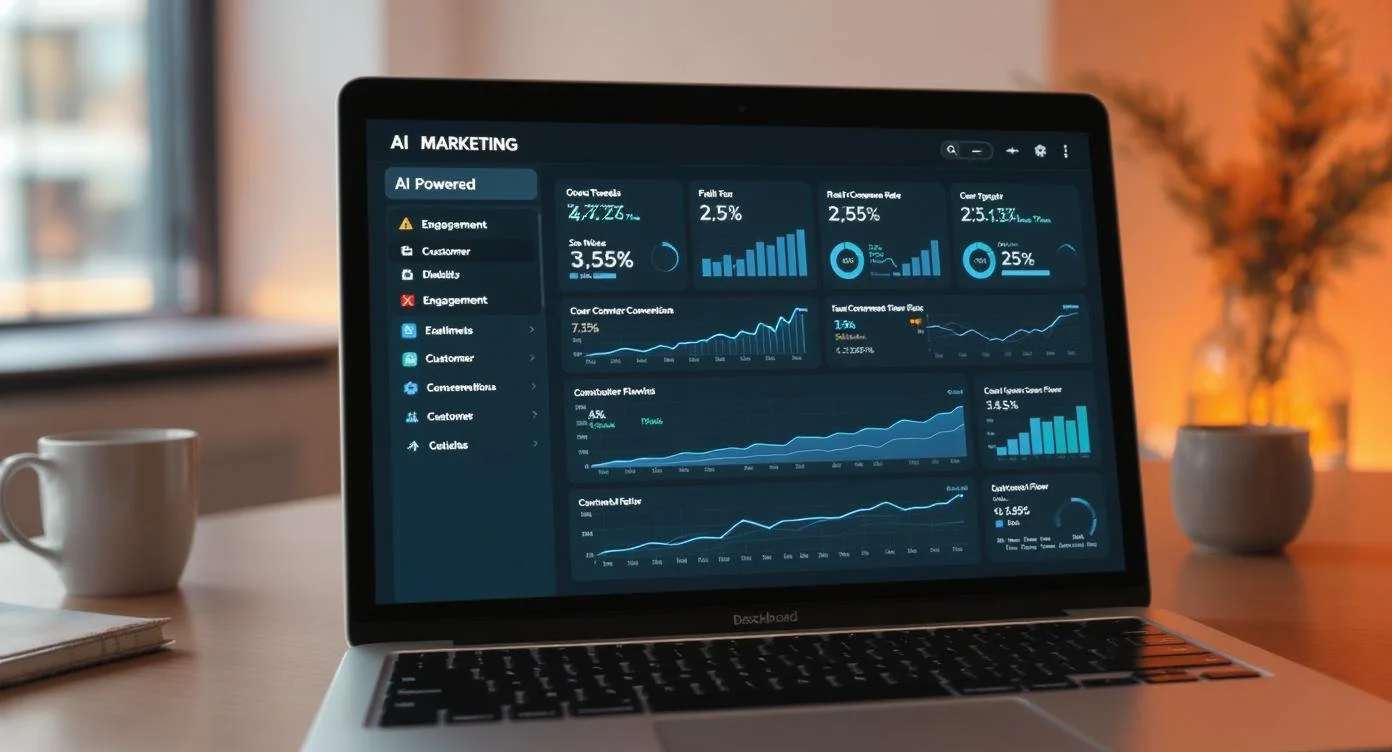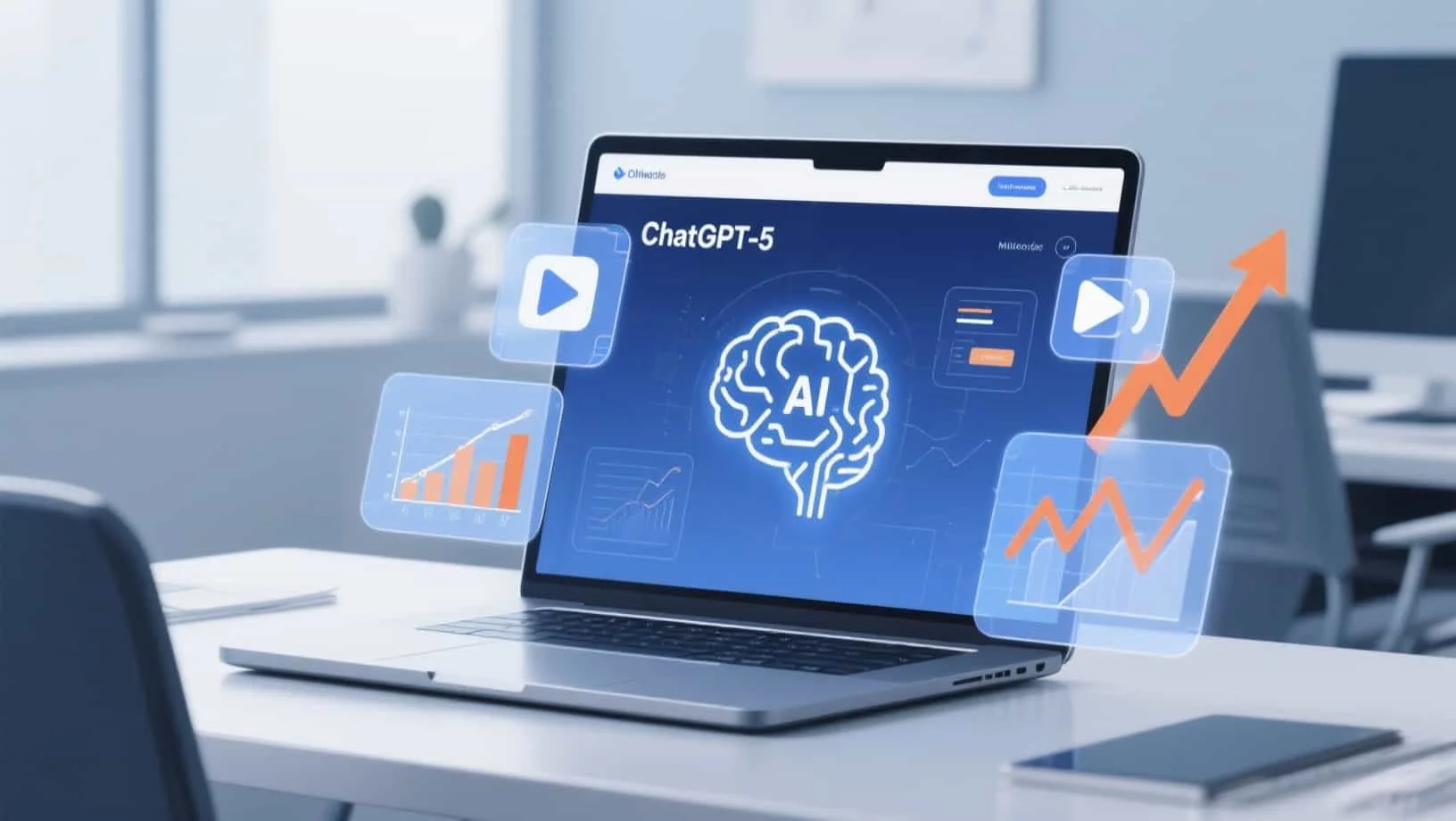Performance marketing in the age of AI: from clicks to conversations
Performance marketing is at a tipping point. While marketers have obsessively optimized clicks, impressions, and conversion rates for years, the focus is now shifting to something fundamentally different: real conversations with customers.
- From clicks to conversations: Focus shifts from generating clicks to building valuable customer relationships
- 90% of content marketers plan AI: Up 64.7% in 2023, conversations are becoming a must-have for successful marketing
- Conversational AI 24/7: Chatbots, voice assistants enable immediate, relevant, personal answers
- Predictive personalization: Machine learning predicts products/content that users find interesting
- Generative Engine Optimization: AI search engines like ChatGPT, Perplexity generate summaries instead of lists
- Engagement new currency: Authentic conversations build stronger communities than the cheapest click
Artificial intelligence is driving this evolution and transforming how we think about online marketing. AI tools make it possible not only to run more personalized campaigns, but also to build truly meaningful interactions with your target audience. Instead of luring people to your website with generic ads, you can now proactively answer their questions, offer advice, and build relationships that go far beyond a one-time purchase.
This shift to AI-driven marketing has everything to do with changing consumer behavior and new search engine technologies that prioritize conversational answers over traditional search results.
This shift has everything to do with changing consumer behavior. Modern buyers expect immediate, relevant, and personal answers. They no longer want to guess which product is best for them—they want guidance, advice, and a feeling that the brand truly understands them.
From transactions to relationships: the new performance marketing
“Search itself will continue to profoundly change in 2025. I think we can tackle more complex questions than ever before. You'll be surprised, even early in 2025, at the kind of newer things search can do compared to where it stands today”
Source: Search Engine Land - Google CEO: Search Will Profoundly Change in 2025
These words perfectly capture the essence of modern performance marketing. Where traditional campaigns focused on maximizing clicks per euro, it is now about creating valuable touchpoints that bring customers closer to your brand.
The numbers speak for themselves: according to research by Salesforce, 84% of customers say that the experience a company offers is just as important as the products themselves. In addition, Gartner has determined that 89% of companies primarily compete on the basis of customer experience.
Just as e-commerce companies must focus on conversion optimization, all marketers must now learn how to use AI for meaningful customer interactions that lead to sustainable growth.
How AI is changing the rules of the game
1. Conversational AI revolutionizes customer service
Chatbots are no longer those frustrating robotic assistants you used to encounter. Modern conversational AI, powered by large language models such as GPT-4, can answer complex questions, provide product advice, and even offer emotional support.
If you want to learn how to write better prompts for AI systems yourself, it is important to understand that modern AI can do much more than just provide standard answers.
2. Predictive personalization in strength
Machine learning algorithms can now not only analyze what customers have done, but also predict what they are likely to do. These predictive analytics make it possible to proactively suggest relevant content, products, or services even before the customer has thought of it themselves.
A good example is Netflix, which recommends 80% of the content that users view via their algorithm. Or Spotify, which surprises millions of listeners every week with their Discover Weekly playlist with music that perfectly matches their taste.
For e-commerce companies, this means that predictive analytics are becoming crucial for conversion optimization and increasing the average order value.
3. Dynamic content creation in real-time
AI can now generate personalized ads, emails, and landing pages in seconds, tailored to the behavior, preferences, and even the mood of individual users.
“In a world where you are flooded with content, you try to find reliable content. Content that is understandable to you in a way that you can reliably use. I think it's becoming more valuable”
Source: Search Engine Roundtable - Watch Google CEO Sundar Pichai Interview
For Shopify users, there are specific AI apps and automations that enable this dynamic personalization without technical knowledge.
4. Generative Engine Optimization: staying visible in the AI era
A new challenge - and opportunity - is Generative Engine Optimization (GEO). AI search engines such as ChatGPT, Perplexity, and Google's AI Overviews no longer only show lists of websites, but generate complete answers based on their training data.
To remain visible in this new landscape, companies must optimize their content for AI systems. This means that your content should not only rank well in Google but also be included in the answers that AI tools generate.
This is especially important for local businesses, as local SEO in Belgium is becoming increasingly AI-driven. Companies must optimize their online presence for both traditional search engines and AI assistants.
Concrete examples from practice
KLM: from call center to conversational hub
KLM has completely transformed their customer service with AI. Their chatbot BlueBot handles more than 16,000 questions daily in 13 different languages. The result? A customer satisfaction score of 8.2 out of 10 and a 40% cost saving on customer service.
“The area where we have applied AI most aggressively in the company was in Search. The gaps in search quality were all based on Transformers. Internally we call it BERT and MUM and we made search multimodal”
Source: Search Engine Land - Google CEO: Search Will Profoundly Change in 2025
Coca-Cola: AI-driven creativity
Coca-Cola uses generative AI to create campaigns that respond to current trends and local events. Their "Create Real Magic" platform enables marketers to generate ads within hours that perfectly match specific moments and locations.
Adobe: personalization at scale
Adobe's AI platform Sensei analyzes the behavior of billions of website visitors to enable real-time personalization. The system can predict which content, products, or offers are most likely to convert for each individual visitor.
The result is impressive: companies that use Adobe Sensei see an average increase of 19% in conversion rates and 24% more revenue per visitor.
For smaller companies that don't have the budget for Adobe Sensei, there are affordable alternatives such as Google Analytics Intelligence and other AI tools for marketers that can achieve similar results.
The new metrics that matter
In the AI era, the KPIs we use to measure success are also shifting. Clicks and impressions remain relevant but are joined by more meaningful metrics that better align with conversational marketing:
Engagement metrics:
Conversation rate: how many visitors start a conversation?
Dwell time: how long do people remain actively engaged?
Return engagement: do people come back for more interaction?
Relationship metrics:
Customer lifetime value (CLV): what is the total value of a customer?
Net Promoter Score (NPS): how likely are customers to recommend you?
Sentiment analysis: how do people feel about their interactions with your brand?
AI-specific metrics:
AI conversation completion rate: how many AI conversations end successfully?
AI satisfaction score: how satisfied are customers with AI interactions?
Human handoff rate: how often does an AI conversation need to be transferred to a human?
If you want to learn more about how to measure and optimize these new metrics, conversion optimization with AI and personalization is an essential skill for modern marketers.
“We are the last generation of executives who will only manage human employees. From this point forward, we will manage not only human employees, but also digital employees”
Source: Fortune - Marc Benioff Says CEOs Will No Longer Lead All-Human Workforces
Practical steps for marketers
1. Start with conversational marketing
Start small by adding chatbots to your website, social media channels, and e-commerce funnel. Tools like Intercom, Drift, or HubSpot make it easy to get started without technical knowledge.
For SMEs that don't know where to start, an AI audit can help identify the best starting points and quick wins.
2. Optimize your content for intent
Focus not only on keywords but also on the underlying questions and needs of your target audience. Think about what people really want to know and provide concrete answers.
This means your SEO strategy needs to evolve into GEO (Generative Engine Optimization) to remain visible in AI-generated search results.
3. Invest in first-party data
Collect as much of your own customer data as possible through surveys, interactions, and behavioral analysis. This data is invaluable for AI systems to make better predictions and personalization.
For e-commerce companies, it is especially important to implement structured data correctly so that AI systems can properly interpret your product information.
4. Experiment with AI tools
Test new AI platforms and integrate them step-by-step into your marketing mix. For example, start with AI for content creation or lead scoring via performance marketing.
For companies considering outsourcing online advertising, AI expertise can be an important factor when choosing a marketing partner.
5. Train your team
Invest in AI skills for your marketing team. Skills such as prompt engineering, data analysis, and customer experience design are becoming increasingly important.
Consider AI training for your team to ensure everyone can use the new tools effectively. Advanced prompt engineering techniques can make the difference between average and excellent AI results.
6. Measure and optimize
Track new metrics such as conversation rate, engagement time, and sentiment analysis. Use this data to continuously improve your AI strategy.
For Shopify users, there are specific SEO checklists that help optimize conversational commerce and AI-driven product discovery.
“AI now does 30% to 50% of the work at Salesforce. We all need to wrap our heads around the idea that AI can do things we used to do, and we can move on to higher-value work”
Source: CNBC - AI is Doing Up to 50% of the Work at Salesforce
Challenges and realistic expectations
Privacy and ethics
With great power comes great responsibility. AI-driven marketing brings privacy risks. Transparency about data usage and respect for customer preferences are essential.
The human factor
AI can do a lot, but it doesn't replace human creativity and empathy. The best results come when AI and human intelligence work together.
Just as there is a debate about AI copywriting versus human creativity, this also applies to performance marketing: the combination of AI efficiency and human strategy delivers the best results.
Technology integration
Integrating AI tools into existing marketing stacks can be complex. Start small and scale up gradually.
For e-commerce companies, it can help to start with AI automation in specific areas before transforming your entire marketing stack.
ROI measurement
Measuring ROI becomes more complex when you shift your focus from direct conversions to long-term relationships. New attribution models are needed.
“Technology is not good or bad, it is what you do with it. It is our job to guide the technology and determine the values. We must choose wisely, design intentionally, and keep people at the center of this revolution”
Source: Fortune - Marc Benioff Says AI is Radically Reshaping Salesforce
The future of performance marketing
Performance marketing is evolving from "the cheapest click" to "the most valuable relationship." Brands that invest in authentic conversations with their customers will not only see more conversions, but also build stronger communities.
The winning formula? Combine the efficiency of AI with the warmth of human empathy. Use technology to create scale, but never lose sight of the personal element.
Just as LinkedIn has become a powerful platform for B2B marketing, AI tools can help you make meaningful connections with your target audience on all channels.
Getting started with AI-driven performance marketing
The shift to conversational marketing is no longer a thing of the future - it's happening now. Companies that get in on this trend early have a competitive advantage that is difficult to catch up with.
At ClickForest, we help companies make this transition. From AI audits that provide insight into your current capabilities to complete AI implementations that transform your marketing. We combine performance marketing expertise with cutting-edge AI technology to achieve measurable results.
For e-commerce companies, we offer specialized Shopify services that integrate AI into every aspect of your online store, from SEO optimization to conversion optimization and lead generation.
The question isn't whether AI will change your performance marketing, but when you're going to take the plunge. The sooner you start building real conversations with your customers, the stronger your position will be in an AI-driven world.
View our case studies to see how we've helped other companies accelerate their digital growth with AI-driven strategies.
Ready to transform your performance marketing with AI? Book a free strategy session with Frederiek Pascal, founder of ClickForest. Together, we'll review your current situation and create a concrete action plan to use AI for more leads, better conversions, and sustainable growth. Contact us or call +32 473 84 66 27 directly.

🚀 More leads, higher conversion, better ROI
This article gave you insights. Now it's time for action. Whether you want to build a profitable webshop, generate more revenue from performance marketing or SEO, or grow with AI-marketing - we'll help you move forward concretely.
💬 Discuss your challenge directly with Frederiek: Schedule a free strategy session or send us a message
📧 Prefer to email? Send your question to frederiek@clickforest.com or call +32 473 84 66 27
Strategy without action remains theory. Let's take your next step together.
Frequently asked questions about AI-driven performance marketing
-
Traditional performance marketing focuses on direct conversions through static campaigns and mass targeting. AI-driven marketing revolves around real-time personalization, dynamic interactions, and building long-term customer relationships through conversations. More about modern performance marketing strategies.
-
Start with conversational interfaces such as chatbots (Intercom, Drift), predictive analytics tools (Google Analytics Intelligence), and AI content platforms (Jasper, Copy.ai). Check out our complete guide on AI tools for marketersand discover which tools best suit your company.
-
Use metrics such as conversation rate, engagement time, customer lifetime value, and sentiment analysis instead of just clicks and conversions. It's about the total value of customer relationships, not just direct sales. Learn more about modern CRO techniques.
-
Many AI tools have affordable subscriptions starting from €20-50 per month. Start small with one tool and scale up gradually. The ROI is often visible within a few months due to improved conversion rates. An AI audit can help identify the best starting points.
-
No, AI enhances human creativity and efficiency. The best results occur when AI takes over routine tasks so marketers can focus on strategy, creativity, and relational aspects. More about the balance between AI and human creativity.
-
GEO is optimizing content so that AI search engines like ChatGPT and Google AI Overviews include your brand in their generated responses. Learn here how to adapt your strategy from SEO to GEO and discover concrete GEO strategies for 2025.
-
Start with a simple chatbot on your website that can answer frequently asked questions. Analyze the conversations to see where customers get stuck and gradually expand the AI capabilities. Specific AI apps are available for Shopify users.
-
Important skills include: prompt engineering, data analysis, customer experience design, AI tool management, and the ability to interpret new metrics such as sentiment analysis. Consider professional AI training for your team.
-
Transparency is key. Let customers know when they are interacting with AI, always give the option to switch to a human, and use data only to help, not to manipulate. More on why hiring a marketing expert is often smarter.
-
Privacy and ethics, integrating new tools into existing systems, training teams, and developing new ROI measurement methods are the main challenges. Start with AI automation to gradually build expertise.
Sources and references
Conversational marketing and AI trends:
Salesforce: "State of the connected customer report 2024" - https://www.salesforce.com/resources/research-reports/state-of-the-connected-customer/
HubSpot: "The future of conversational marketing" - https://blog.hubspot.com/marketing/conversational-marketing-study
Gartner: "Customer experience trends 2025" - https://www.gartner.com/en/customer-service-support/trends/customer-experience-trends
AI-driven personalization:
McKinsey: "The next frontier of personalized marketing" - https://www.mckinsey.com/capabilities/growth-marketing-and-sales/our-insights/unlocking-the-next-frontier-of-personalized-marketing
Adobe: "Digital experience index 2024" - https://business.adobe.com/resources/digital-experience-index.html
Accenture: "Personalization pulse check 2024" - https://www.accenture.com/us-en/insights/interactive/personalization-pulse-check
Performance metrics and ROI:
Forrester: "AI marketing ROI benchmark study" - https://www.forrester.com/report/the-roi-of-ai-in-marketing/
Deloitte: "Marketing measurement in the AI era" - https://www2.deloitte.com/us/en/insights/topics/marketing-and-sales-operations/marketing-measurement-ai-era.html











